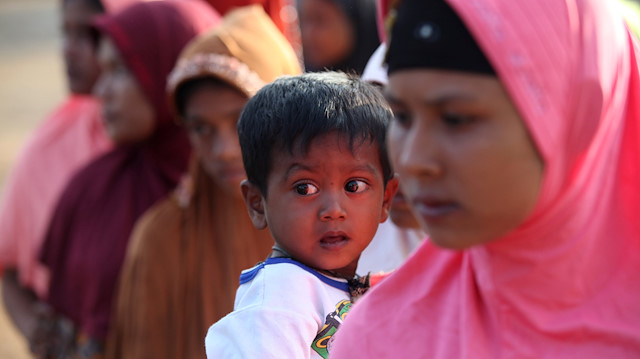
Saudi Arabia has been holding thousands of Rohingya Muslims in a detention camp in Jeddah, says Rohingya activist
Outspoken Burmese activist Ro Nay San Lwin sheds light on Saudi Arabia’s infamous al-Shumaisi Detention Center in Jeddah, where thousands of Rohingya Muslims, who fled from violence and persecution in their homeland of Myanmar’s Rakhine state to the kingdom, are held because Riyadh claims they entered illegally. Lwin is a coordinator of the Free Rohingya Coalition and has been living abroad since 2001 because of the restrictions of his home country.
Since Aug. 25, 2017, nearly 24,000 Rohingya Muslims have been killed by Myanmar’s state forces, according to a report by the Ontario International Development Agency (OIDA).
More than 34,000 Rohingya were also thrown into fires, while over 114,000 others were beaten, said the OIDA report, titled "Forced Migration of Rohingya: The Untold Experience."
Some 18,000 Rohingya women and girls were raped by Myanmar’s army and police and over 115,000 Rohingya homes were burned down and 113,000 others vandalized, it added.
First of all, it is necessary to note that there are approximately 300,000 Rohingya Muslims in Saudi Arabia. Most of these people entered with the passports of Bangladesh and surrounding countries. Unfortunately, unjust treatment of these passports were fake and they became illegal. There have been two cases of victimization. People who were forced to leave their lands under the pressure of the Myanmar state were defrauded by human traffickers. Before 2010, this situation was relatively tolerable because the introduction of fingerprinting in Saudi Arabia had not started yet. In this case, even if you entered the country illegally, you could stay for many years without being pursued. With the implementation of fingerprint scanning, this has been eliminated. The state can easily find you wherever you go. Rohingya Muslims do not want to live illegally. They want to live a normal life, earn money and take care of their families. Unfortunately, they have to pay the price of being stateless wherever they go.
There is al-Shumaisi Detention Center in Jeddah. Of course, we cannot know the exact figure [of detained Rohingya] because there is no official number. However, I believe there are two to three thousand Rohingya Muslims held there. The camp is quite large, and I believe it has the capacity to host 30,000 people. It is possible to say that the conditions are not very different to a concentration camp.
We are talking about a place where communication facilities are very limited: there is no newspaper and television, and even mobile phones can only be provided by illegal means. It is essentially the life of a prisoner: your freedom is taken away. Some people can't get out of there for years. There are even those who cannot stand the conditions, lose hope for the future and commit suicide. The administration of Saudi Arabia has to provide refugee status to these victims and get them out of that camp immediately.
Yes, they are sending people back to the countries they came from. Those who enter Saudi Arabia via Bangladesh are relatively lucky, because there is an agreement between the two countries. Bangladesh has to take back refugees from Saudi Arabia. However the situation is dire for those who entered Saudi Arabia from India, Pakistan and Nepal, because these countries do not want to take back the Rohingya. Many of those who stayed at Shumaisi for extended periods and went mad and committed suicide, are from these countries.
These people are not involved in any crime. Just like everybody else, they are normal people. There are some who have been held in the camp for five to six years. Besides, they have come there after already being victims. And they have had to suffer further. This is a human tragedy. There is, of course, a violation of human rights. However, as you will appreciate, there is no point in raising any issue in Saudi Arabia in the context of human rights. It's not ready for such a concept yet. It is unthinkable for anyone to go out on the street and make an ordinary, simple action regarding human rights. It's a geography where security concerns are overwhelming. Even its own citizens cannot raise their voices about freedoms, and I do not think that foreigners have such a luxury.
Everything depends on the international community's response. It is clear that the Myanmar government committed genocide and a crime against humanity. If there is serious pressure on the administration of Myanmar, at least some fundamental rights will come to the agenda. Otherwise, it appears that there will be no possible improvement in the current situation. However, regardless of what is done or not done, we will continue to put up our own fight. We will continue to protect the dignity and rights of our people. We will raise our voice through every platform that we can find, because this is our cause of existence.
I have elaborated on the matter in writing to both the Saudi authorities and the OIC. I asked them to help with the solution. To this day, I have not received a reply from either of them.
Unfortunately, they preferred to ignore the tragedy in their immediate vicinity. They know very well that the Rohingya are stateless people. In this world, there is a place where every community, all peoples can feel safe. Even the OIC did not back my people. This is a great shame. Can they say that they were not aware of the situation? We are a community that has been on the agenda of the world for years. Is there anyone who does not know of the pain we suffered? Moreover, we also informed them. We said: “There is a tragedy, please help.” We said this many times, but nobody cares. My people are treated like common criminals in the detention camp. What hurts the most is that the situation is pawned off as if it were supposed to be this way.








